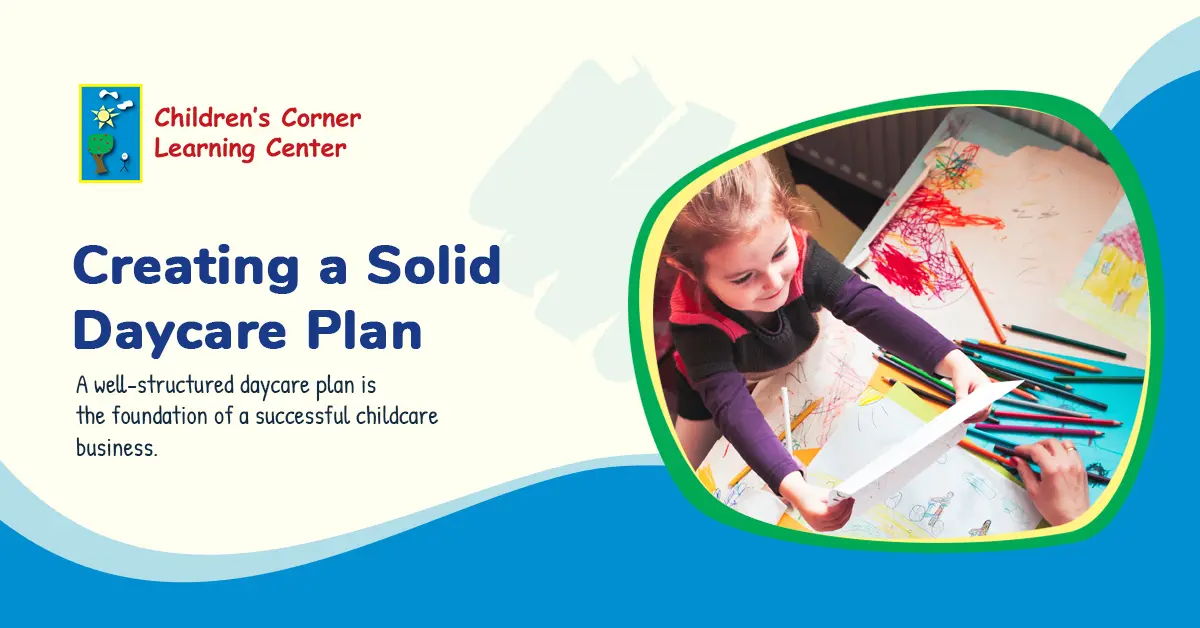Building a daycare center is an exciting journey that allows you to create a safe, nurturing setting where children can grow and thrive. Whether you’re an educator, entrepreneur, or passionate caregiver, starting your daycare requires careful planning and dedication. Each step is vital in shaping a thriving childcare center, from securing a location to designing engaging learning environments.
But beyond logistics, it’s about fostering a warm, welcoming atmosphere where families feel confident entrusting their little ones. With the proper foundation—thoughtful curriculum, qualified staff, and a strong connection with the community—you can build a daycare that meets essential regulations and becomes a cherished part of children’s early development.
Creating a Solid Daycare Plan

A well-structured daycare plan is the foundation of a successful childcare business. It helps you define your goals, anticipate challenges, and ensure that your daycare meets both regulatory requirements and parents’ expectations. By mapping out essential details in advance, you can create a smooth-running center that provides quality care for children while remaining financially stable.
Defining Your Daycare Vision
Before you begin the setup process, it’s essential to establish a clear vision for your daycare. This will guide your decisions on curriculum, services, and overall operations. Think about what sets your daycare apart and what environment you want to create.
- Target Age Group: Decide whether your daycare will serve infants, toddlers, preschoolers, or a mix of age groups.
- Educational Approach: Choose a teaching philosophy, such as play-based learning, Montessori, or a structured academic curriculum.
- Care Schedule: Determine if you offer full-time, part-time, or after-school care to accommodate different family needs.
- Unique Features: Consider any special programs, such as bilingual education, outdoor learning, or STEAM-focused activities.
By outlining these core elements, you can craft a mission that resonates with parents and ensures your daycare stands out in the community.
Conducting Market Research
Understanding the childcare needs in your area is essential to building a daycare that attracts families. Researching the local market helps you make informed decisions about pricing, location, and the services you should offer.
- Local Demand: Identify how many parents in your area are searching for childcare services.
- Competitor Analysis: Visit other daycare centers to observe their strengths, weaknesses, and pricing models.
- Parent Preferences: Conduct surveys and/or interviews with parents to learn about their priorities when selecting a daycare.
- Ideal Location: Choose a spot that is convenient, accessible, and close to residential areas or workplaces.
By gathering this information, you can tailor your daycare services to fit community needs and gain a competitive edge.
Budgeting and Securing Funding
Financial planning is a crucial part of any daycare plan. Startup costs, operational expenses, and emergency funds should all be considered to ensure long-term sustainability.
- Initial Costs: Factor in expenses such as licensing, facility renovations, furniture, and educational supplies.
- Operational Expenses: Include ongoing costs like staff salaries, utilities, insurance, and food supplies.
- Funding Options: Explore grants, small business loans, or government assistance programs to support your startup.
- Emergency Reserve: Set aside funds for unexpected expenses, such as repairs, regulatory changes, or enrollment fluctuations.
A clear financial plan will help you manage expenses efficiently and keep your daycare running smoothly without financial strain.
Establishing Policies and Procedures
A well-organized daycare requires clear policies to ensure smooth daily operations and a safe, structured environment for children. These policies also provide transparency for parents and set expectations for staff.
- Enrollment and Fees: Outline tuition rates, payment schedules, and late fees to avoid confusion.
- Health and Safety: Establish rules for sick child policies, sanitation procedures, and emergency preparedness.
- Daily Schedule: Create a structured routine for meals, naps, and learning activities to provide consistency.
- Behavior Management: Define discipline approaches focusing on positive reinforcement and conflict resolution.
By implementing these policies early on, you can create a daycare environment where children feel secure, parents feel confident, and staff can operate efficiently.
Understanding the Requirements to Open a Daycare

Starting a daycare includes more than just a love for children—it requires meeting specific legal, safety, and operational standards. Understanding the requirements to open a daycare ensures that your center complies with regulations while providing children with a safe, nurturing space. From licensing to health standards, you must consider the key requirements.
Licensing and Legal Requirements
Before opening your daycare, you must obtain the licenses and permits to operate legally. These regulations vary by state and local jurisdiction, so it’s essential to research the specific requirements for your area.
- State Licensing: Each state has different childcare licensing requirements that outline facility standards, staff-to-child ratios, and training requirements.
- Business Registration: Register your daycare as a business entity, such as an LLC or sole proprietorship, to establish its legal status.
- Zoning and Permits: Ensure your location complies with zoning laws and obtain necessary permits for a childcare facility.
- Background Checks: Staff members and daycare owners must pass criminal background checks to ensure child safety.
Obtaining the proper licenses and permits keeps your daycare compliant and builds trust with parents seeking reliable childcare services.
Health and Safety Standards
Maintaining a safe and healthy setting is one of the most critical requirements to open a daycare. Proper safety techniques help prevent accidents and ensure children’s well-being.
- Facility Safety: Childproof your daycare by installing secure gates, outlet covers, and slip-resistant flooring.
- Emergency Preparedness: Clear evacuation plans, fire extinguishers, and first aid kits should be readily available.
- Hygiene and Sanitation: Implement daily cleaning schedules to disinfect toys, surfaces, and restrooms.
- Health Policies: Establish procedures for handling sick children, vaccinations, and medication administration.
By prioritizing safety and hygiene, you create a setting where children can learn and play confidently while parents feel reassured about their children’s well-being.
Staffing and Training Requirements
Hiring qualified staff is essential for providing high-quality childcare. Each state has specific regulations regarding staff qualifications, training, and child-to-caregiver ratios.
- Minimum Education Levels: Some states require caregivers to have a high school diploma, while others mandate early childhood education degrees.
- CPR and First Aid Certification: All staff should be trained in emergency response procedures.
- Staff-to-Child Ratios: Licensing laws dictate how many children each caregiver can supervise based on age groups.
- Ongoing Training: Many states require caregivers to complete annual training on childcare best practices and safety protocols.
Ensuring your staff meets these qualifications creates a professional and nurturing daycare environment that fosters child development.
Curriculum and Program Guidelines
Daycares must offer structured learning and development programs that align with state and early childhood education guidelines. Your curriculum should cater to children’s cognitive, emotional, and social growth.
- Age-Appropriate Activities: Design programs for infants, toddlers, and preschoolers to promote learning at every stage.
- Play-Based Learning: Incorporate hands-on activities that encourage creativity and problem-solving.
- Daily Routine Structure: Provide a balanced schedule that includes playtime, meals, and rest periods.
- Inclusion Policies: Ensure your daycare accommodates children of all abilities and backgrounds.
Developing a structured program provides children with enriching experiences that support their learning and development.
Essential Skills and Responsibilities of a Daycare Owner

Becoming a daycare owner is both a rewarding and demanding role that requires diverse skills. Running a childcare center goes beyond supervising children—it involves managing staff, confirming compliance with regulations, and creating a nurturing area where children can thrive. To build a successful daycare, owners must possess essential leadership, communication, and business management skills. Here’s what it takes to run a daycare center effectively.
Leadership and Management Skills
A daycare owner must be an effective leader, guiding staff and families while ensuring smooth daily operations. Strong leadership skills help create a positive environment where employees and children feel supported.
- Decision-Making: Owners must make informed choices about staffing, curriculum, and business strategies to keep the daycare running efficiently.
- Problem-Solving: Finding quick and effective solutions is key, from handling scheduling conflicts to addressing parent concerns.
- Organization: Managing paperwork, enrollment records, and financial documents requires strong organizational skills.
- Time Management: Juggling multiple responsibilities, from overseeing staff to meeting licensing requirements, demands excellent time management.
By developing these leadership skills, daycare owners can create a well-structured and nurturing childcare environment.
Building a Strong Team
A successful daycare relies on a dedicated team of caregivers, teachers, and support staff. As a daycare owner, hiring and training the right people ensures children receive high-quality care.
- Recruitment Skills: Finding qualified educators and caregivers who align with your daycare’s philosophy is essential.
- Training and Development: Ongoing training helps staff stay updated on childcare best practices.
- Team Motivation: Encouraging a positive work culture increases staff satisfaction and reduces turnover.
- Conflict Resolution: Addressing staff concerns and maintaining a harmonious workplace improves efficiency.
By investing in a well-trained and motivated team, daycare owners can foster a positive and enriching atmosphere for children.
Marketing and Enrollment Management
Attracting families to your daycare requires strategic marketing and a strong community presence. As a daycare owner, you ensure steady enrollment and build trust with parents.
- Online Presence: Maintaining an informative website and active social media accounts helps attract new families.
- Community Outreach: Partnering with local organizations and attending events increases visibility.
- Referral Programs: Encouraging word-of-mouth marketing through parent referrals can boost enrollment.
- Tours and Open Houses: Hosting events where parents can visit the facility helps build trust and confidence.
A strong marketing strategy ensures that families know your daycare’s unique offerings and feel confident choosing your center.
Parental Communication and Engagement
Developing strong relationships with parents is crucial for running a successful daycare. Open communication fosters trust and reassures parents that their children are in a safe and caring environment.
- Regular Updates: Sending newsletters, emails, or app notifications keeps parents informed about their child’s progress.
- Parent Meetings: Hosting conferences or casual check-ins allows for discussions about child development.
- Feedback Collection: Encouraging parents to share concerns and suggestions helps improve daycare services.
- Transparent Policies: Clearly outlining rules and procedures ensures parents understand expectations.
By maintaining strong parent relationships, daycare owners create a supportive, engaged community that benefits children and families.
Conclusion
Starting a daycare is more than just a business venture—it’s an opportunity to shape young minds, support families, and impact your community. With a solid daycare plan, a deep understanding of licensing and safety requirements, and the right leadership skills, you can build a thriving childcare center that parents trust and children love. Every step takes you closer to a successful, rewarding journey as a daycare owner, from crafting a nurturing learning environment to managing daily operations.
If you’re ready to turn your vision into reality, Children’s Corner Learning Center is here to help! Schedule a tour today and see how we’ve built a strong foundation in early childhood education. Call us at (800) 933-7757 or visit this page to book your visit today!









